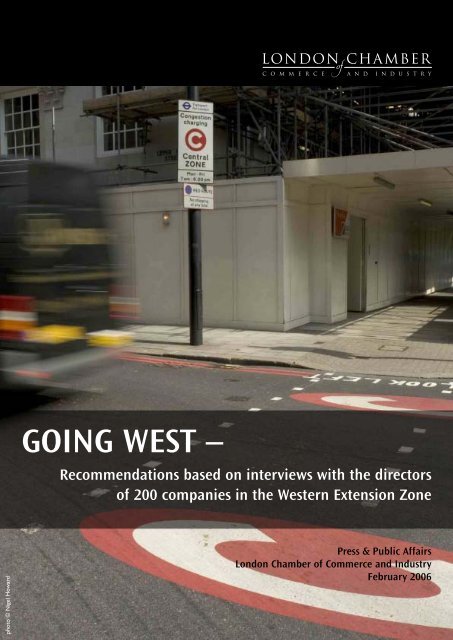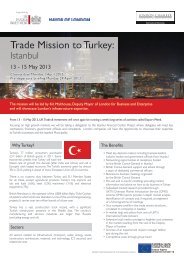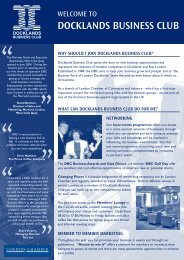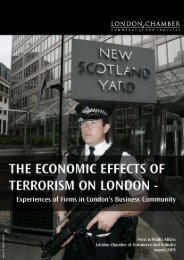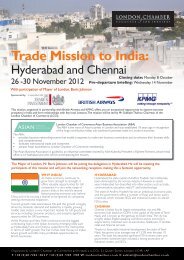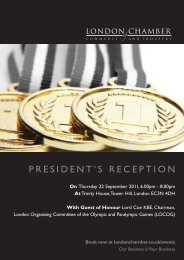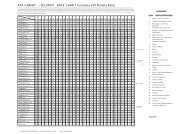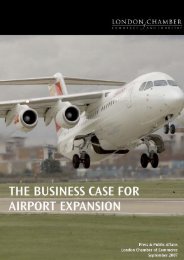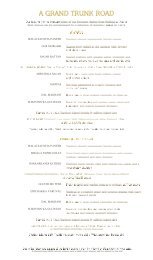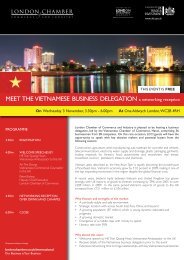GOING WEST â - London Chamber of Commerce and Industry
GOING WEST â - London Chamber of Commerce and Industry
GOING WEST â - London Chamber of Commerce and Industry
You also want an ePaper? Increase the reach of your titles
YUMPU automatically turns print PDFs into web optimized ePapers that Google loves.
<strong>GOING</strong> <strong>WEST</strong> –Recommendations based on interviews with the directors<strong>of</strong> 200 companies in the Western Extension Zonephoto © Nigel HowardPress & Public Affairs<strong>London</strong> <strong>Chamber</strong> <strong>of</strong> <strong>Commerce</strong> <strong>and</strong> <strong>Industry</strong>February 2006
Going West -Recommendations based on interviews with the directors <strong>of</strong>200 companies in the Western Extension ZonePress & Public Affairs<strong>London</strong> <strong>Chamber</strong> <strong>of</strong> <strong>Commerce</strong> <strong>and</strong> <strong>Industry</strong>February 20061
The <strong>London</strong> <strong>Chamber</strong> <strong>of</strong> <strong>Commerce</strong> has 10,000 business customers across thecapital, ranging in size from multi-national companies such as BT <strong>and</strong> Thames Waterto sole traders.Without exception, our policies are always informed by the experiences <strong>of</strong> ourmember companies. The objective is to ensure that the private sector in <strong>London</strong>,which is the principal engine <strong>of</strong> the national economy, is able to operate on a levelplaying field, free from unnecessary hindrance from bureaucrats <strong>and</strong> politicians alike.It is only by putting <strong>London</strong>’s businesses first that the capital can maintain itsoutst<strong>and</strong>ing record for creating well-paid jobs, leading the world in service provision<strong>and</strong> being Europe’s favourite location for foreign direct investment.For further information or to discuss this report, please contact:Dan Bridgett, director <strong>of</strong> press & public affairs<strong>London</strong> <strong>Chamber</strong> <strong>of</strong> <strong>Commerce</strong> <strong>and</strong> <strong>Industry</strong>, 33 Queen Street, <strong>London</strong> EC4R 1AP(T: 020 7203 1897 or email: dbridgett@londonchamber.co.uk)This report was researched <strong>and</strong> compiled by:James Heal, press & public affairs executive (T: 020 7203 1829 or e-mail:jheal@londonchamber.co.uk)Christiane Bruening, press & public affairs executive (T: 020 7203 1882 or e-mail:cbruening@londonchamber.co.uk)James Ford, senior press & public affairs executive (T: 020 7203 1889 or e-mail:jford@londonchamber.co.uk)Linda Palmer, senior press & public affairs executive (T: 0207 7203 1911 or e-mail:lpalmer@londonchamber.co.uk)2
IndexExecutive Summary 6Introduction 8Views on the WEZ 10Value for money?Heading in the wrong direction: why the West?ConsultationConcessionsThe Impact on business 15Concurrence <strong>of</strong> evidence, conflict <strong>of</strong> conclusionsThe retail sector: bearing the bruntPredicting the impact in the WEZImpact on employmentTowards a better congestion charge 20Payment optionsOperating hoursMonitoring <strong>and</strong> assessmentNational road pricing: a smarter alternative?Conclusion 24Companies which contributed to the report 26Appendix: statistical responses to the interview questions 293
Trotters (King’s Road, SW3), Richard Ross, proprietor“I am not against the congestion charge. But it needs to be clear, fair <strong>and</strong> haveproper aims. Pre-pay, like the Oyster card, would be easier to use. It would be betterto have the congestion charge only in the morning to stop commuting. [National roadpricing] would be one option, but it would have to apply to the whole area within theM25. To single out certain areas is totally unacceptable.”Harrods (Knightsbridge, SW1), Peter Willasey, corporate communications director“Due to certain events that have occurred <strong>and</strong> in the run-up to the Olympics, we needto be given leg-ups to do better, not more stiles to climb over.”King’s Road Trade Association (King’s Road, SW3), Hazel Smith, chair“[Paying up to 24 hours later] is an improvement, but not good enough. It is stillcriminalising people. I can pay any other bill at a lesser stage than 24hours…[national road pricing} is a much fairer system.”Agius Scooters (Edgware Road, W2), Brian Backman, consultant“[The congestion charge] has helped us as a business because our product,scooters, don’t pay the charge.”Peter Jones (Sloane Square, SW1), Nigel Brotherton, corporate affairs director,John Lewis Partnership“Serious congestion in the WEZ is limited to a few specific hotspots. These could betackled through careful traffic management instead <strong>of</strong> introducing the WEZ.”Harvey Nichols (Brompton Road, SW3), Joseph Wan, group chief executive“We are unsure whether there has been total transparency to the public at largeabout operating costs compared to revenue generation.”Bourbon Hanby Antiques Centre (Sydney Street, SW3), Les Barrett, proprietor“Do it like in Greece: three days a week only cars with even numbers are allowed onthe road, during the other three days it’s cars with odd numbers. This is very effectivein reducing traffic. At the same time it does not harm business <strong>and</strong> doesn’t costanything.”Major retailer, Head <strong>of</strong> public affairs“[The current congestion charging scheme] has had an impact in terms <strong>of</strong> reducedcongestion but it has come at a price. Certain sectors have suffered. We should pushfor a postponement [<strong>of</strong> WEZ] until we have overcome difficulties in the retail sector.”Chelsea Potter (King’s Road, SW3), Jason Wadsworth, manager“The proposal to allow payments to be made until midnight the day after you enteredthe zone is more user-friendly but will not improve trading conditions in the WEZ.”Janet Reger International (Beauchamp Place, SW3), Janet Reger, chief executive“People will think twice about driving into the zone, especially now that the price hasbeen increased to £8.”4
Major high street retailer, Public Policy Manager“The Mayor’s position is that business is only marginally affected. We shouldremember that for a 1 per cent loss <strong>of</strong> sales we lose about 2 per cent in pr<strong>of</strong>it. So a‘marginal’ or ‘negligible’ loss <strong>of</strong> 5 per cent in sales could be a 10-12 per cent loss inpr<strong>of</strong>it, which is significant.”“Its like using a hammer to break a nut. If you want to drive business out <strong>of</strong> the urbancentre, this is a step in the right direction. We will go where public policy drives us.There will be a movement <strong>of</strong> investment <strong>and</strong> employment away from the traditionalcentre.”Hotspur Ltd (Lowndes Street, SW3), Robin Kern, director“Traffic is the lifeblood <strong>of</strong> the city <strong>and</strong> if you take the traffic away, the city dies.”TM Lewin (King’s Road, SW3), Fiona V<strong>and</strong>a, corporate manager“The WEZ is a predominantly residential area with mainly small shops wherecongestion is not a major problem. I cannot see how the congestion charge willimprove the area in one way or the other. It will be disastrous.”Percy Bass Furnishing (Walton Street, SW3), Jane Morris, proprietor“We should improve water transport <strong>and</strong> improve transport to schools. Simply useother measures to decrease congestion.”After Noah Retail (King’s Road, SW3), Simon Tarr, general manager“[A charge-free window] is an improvement. But the danger is that the schemebecomes too complicated. Instead the congestion charge should end at 11am. Thiswould stop commuting <strong>and</strong> allow trade. Also, the charge should be takenautomatically – like they do at the moment with companies that have more than 20vehicles.”C Lidgate, (Holl<strong>and</strong> Park, W11), David Lidgate, proprietor“We are currently using something crude <strong>and</strong> very damaging with obsoletetechnology. We need a sophisticated system which is flexible to all circumstances.”Guinevere Antiques (King’s Road, SW6), Mark Weaver, director“Some sort <strong>of</strong> uniform scheme would be better than penalising central <strong>London</strong> <strong>and</strong>central <strong>London</strong> businesses.”5
Executive Summary• February 2006 is not just the third birthday <strong>of</strong> the central <strong>London</strong> congestioncharge it also marks the start <strong>of</strong> the countdown to the expansion <strong>of</strong> thecharging zone when the Western Extension Zone (WEZ) goes live inFebruary 2007. To mark this anniversary the <strong>London</strong> <strong>Chamber</strong> <strong>of</strong> <strong>Commerce</strong><strong>and</strong> <strong>Industry</strong> (LCCI) conducted detailed telephone interviews with more than200 company directors operating businesses within the proposed WEZ.• Some 82 per cent <strong>of</strong> those surveyed said that they expected the WEZ to havea negative impact on their business <strong>and</strong> 90 per cent felt they would see nobenefit from a reduction <strong>of</strong> congestion in the WEZ. Just 4 per cent anticipateda positive impact on their business <strong>and</strong> just under 10 per cent felt that thereduction in congestion would improve their company’s performance.• Some 77 per cent <strong>of</strong> company directors said they expected the WEZ toimpact negatively upon employment levels in the zone <strong>and</strong> some 36 per centfelt they could have to reduce their own staff levels.• Just under a quarter <strong>of</strong> those surveyed said they would consider relocating orclosing their business as a result <strong>of</strong> the WEZ.• Some 96 per cent <strong>of</strong> respondents said they believed that the Mayor hadignored both public consultations into the WEZ.• In order to gauge accurately the impact <strong>of</strong> the WEZ on local firms the LCCIpropose to survey the same businesses again two months after theintroduction <strong>of</strong> the WEZ. This report will serve as a base for comparison withfuture surveys because one <strong>of</strong> the major criticisms <strong>of</strong> previous researchconducted in the central <strong>London</strong> zone was that there was insufficienteconomic data on business performance in the period to the start <strong>of</strong> thecharge to compare subsequent research against.• Some 77 per cent <strong>of</strong> those surveyed said that, since its introduction threeyears ago, the current congestion charge scheme had had a negative impactupon business in <strong>London</strong> whilst just 4 per cent felt the charge’s impact hadbeen positive. Just under a fifth <strong>of</strong> respondents agreed with TfL’s <strong>of</strong>ficialposition, that the charge’s impact had been neutral.• However, the survey found that people were more positive about thecongestion charge’s impact on traffic levels. Some 35 per cent <strong>of</strong> thosesurveyed said the charge had reduced congestion in the central zone. Justunder two-fifths, however, felt the charge had had a neutral effect on traffic<strong>and</strong> 26 per cent felt that the charge had not succeeded in reducingcongestion.• The LCCI survey not only aimed to gauge company directors’ opinions on theWEZ but also sought to encourage the business community to suggest waysto improve the scheme <strong>and</strong> make it more business friendly.6
• A proposal to end the congestion charge at 1pm each day was supported by71 per cent <strong>of</strong> respondents whilst the creation <strong>of</strong> a daily charge-free windowbetween 11am <strong>and</strong> 2pm attracted the support <strong>of</strong> 55 per cent <strong>of</strong> thosesurveyed.• Some 51 per cent <strong>of</strong> those surveyed supported the idea <strong>of</strong> a national roadpricing scheme whilst 43 per cent were opposed.• As a result <strong>of</strong> this research, the <strong>London</strong> <strong>Chamber</strong> <strong>of</strong> <strong>Commerce</strong> is making fivepolicy recommendations to improve the congestion charge:oooooFirstly, that the daily congestion charging period should end at 1pm.We believe that this change will <strong>of</strong>fer a vital life-line to many businesseswithin the WEZ <strong>and</strong> existing c-zone, especially retailers <strong>and</strong>restaurateurs, whilst still deterring drivers from bringing their cars intocentral <strong>London</strong> during the morning rush hour. By proposing to end thecongestion charge half an hour earlier, (at 6pm) as a concession topushing ahead with the WEZ scheme, we believe that the Mayor hasimplicitly conceded the principle that ending the charge earlier is goodfor business.Secondly, that TfL should be more flexible <strong>and</strong> proactive in operatingcharge-free periods to stimulate the <strong>London</strong> economy at key timesduring the business year. In particular, the LCCI calls on TfL tosuspend the charge during the final full week before Christmas – themost important trading week <strong>of</strong> the year – each <strong>and</strong> every year.Thirdly, that TfL should consider the introduction <strong>of</strong> a flexiblecongestion charge Oyster-style pre-payment scheme for the benefit<strong>of</strong> those drivers who only travel into or through the WEZ or existing c-zone periodically, but not <strong>of</strong>ten enough to derive benefit from theweekly, monthly or annual payment options. Pre-pay accounts could betopped up by telephone or online using an adapted form <strong>of</strong> the currentpayment technology.Fourthly, that TfL agree to support <strong>and</strong> pay for ongoing independentmonitoring <strong>and</strong> assessment <strong>of</strong> the impact <strong>of</strong> the congestion charge onbusinesses in <strong>and</strong> around the zone leading to the publication <strong>of</strong> anannual report. It is vital that business has a role in commissioning <strong>and</strong>shaping this research <strong>and</strong> that both TfL <strong>and</strong> the Mayor’s Office agree toendorse its findings.Finally, if a national road pricing scheme was introduced then TfLshould guarantee it will suspend the congestion charge <strong>and</strong>,ultimately, incorporate <strong>London</strong> into the national scheme. Operating thecongestion charge as a st<strong>and</strong> alone cost means it serves as a tax ondoing business in a specific area. In the meantime, the LCCI expecttechnology to be a key consideration before adopting a nationalscheme. The LCCI is yet to take a formal position on National RoadPricing but believes it to be imperative that the evolution <strong>of</strong> congestioncharging in <strong>London</strong> be viewed in the context <strong>of</strong> the wider debate on roadpricing.7
1. IntroductionThe purpose <strong>of</strong> this report is to examine the concerns <strong>of</strong> company directors runningbusinesses in the Western Extension Zone (WEZ); determine how they expect theirbusiness <strong>and</strong> the wider economy to look once the charge has been implemented;<strong>and</strong> to determine what modifications to c-charging need to be made if the Mayor is toimplement the extension <strong>of</strong> the charge with some business support rather than littleor none.It is important to state that unless changes are urgently made, the Mayor’s flagshippolicy will be implemented with the outright opposition <strong>of</strong> one <strong>of</strong> his key stakeholders- the business community.This February is the third anniversary <strong>of</strong> the central <strong>London</strong> congestion chargingscheme. In one year from now, congestion charging is scheduled to be extendedwest to cover much <strong>of</strong> Kensington, Chelsea <strong>and</strong> Notting Hill. The <strong>London</strong> <strong>Chamber</strong> <strong>of</strong><strong>Commerce</strong> (LCCI) has monitored the congestion scheme closely <strong>and</strong> has kept incontinuous contact with those affected within the area. Maintaining our principle <strong>of</strong>listening to businesses, we have conducted detailed interviews with 201 companiessituated in the WEZ. Interviews were conducted with a variety <strong>of</strong> businesses rangingfrom large high-street chain retailers to small independent traders. As well asretailers <strong>and</strong> restaurateurs, company directors from a broad range <strong>of</strong> companieswere consulted including, wholesalers, transportation companies, consultancies,hoteliers, manufacturing <strong>and</strong> financial services companies.The information <strong>and</strong> opinions gained from these businesses form the basis <strong>of</strong> thisreport which aims to assess the potential impact <strong>of</strong> congestion charging on businessin the WEZ.From these discussions with company directors, the LCCI has gathered a largevolume <strong>of</strong> feedback which could be used as a basis for reforming the planned WEZ<strong>and</strong> minimising damage to the area’s economy. We have made a number <strong>of</strong> policyrecommendations based on the information received from businesses in the WEZ,which are set out in the Executive Summary.The LCCI accepts that traffic congestion has an adverse effect on business <strong>and</strong> wewelcome attempts to tackle the problem. Before the introduction <strong>of</strong> the originalscheme in central <strong>London</strong>, the LCCI listed three conditions which it felt should be metbefore the charge was introduced.These conditions were:a) That there was a clear <strong>and</strong> measurable improvement in public transport before thescheme was introduced.b) That we were satisfied that the practical details <strong>of</strong> the scheme were workable.c) That there was no significant damage to business as a result.The LCCI remains unconvinced that conditions a) <strong>and</strong> b) have been met <strong>and</strong> fromour surveys <strong>and</strong> interviews with businesses affected by the charge, it is clear that thecurrent system <strong>of</strong> congestion charging has had a significant <strong>and</strong> generally negativeimpact on business.8
<strong>London</strong>’s economy has suffered some serious blows in recent months. The generalslowdown in the retail <strong>and</strong> manufacturing sectors has been exacerbated by the falloutfrom the terrorist attacks <strong>and</strong> the continued <strong>and</strong> significant threat <strong>of</strong> terrorism inthe capital. The LCCI’s <strong>London</strong> Monitor survey <strong>of</strong> 441 companies in <strong>and</strong> around thecapital in the final quarter <strong>of</strong> 2005 showed that business confidence in <strong>London</strong>’seconomy is in its third consecutive quarter <strong>of</strong> being negative. This is the longest run<strong>of</strong> negative confidence since the survey started seven years ago. 1 Fears about rawmaterial prices, an unspectacular Christmas for retailers, a depressed tourist sector,flat house prices <strong>and</strong> concerns over debt <strong>and</strong> pensions all contribute to the gloomyoutlook. It is on these foundations that the GLA is looking to extend a chargingscheme which businesses in the current zone have claimed has a negative impact ontheir turnover.9
2. Views on the WEZValue for money?The Mayor claims that the Western Extension will raise extra money that can beinvested in public transport. Despite these claims, there is evidence to suggest thatthe extension is barely financially sustainable, let alone pr<strong>of</strong>itable. Concerns aboutthe financial viability <strong>of</strong> the congestion charge have also been raised by interviewees.Joseph Wan, group chief executive <strong>of</strong> Harvey Nichols, is ‘unsure whether there hasbeen total transparency to the public at large about operating costs compared to therevenue generated’.The installation <strong>of</strong> what Simon Burnett, proprietor <strong>of</strong> Pure Parking, called the ‘terriblyinefficient scheme’, will cost £118 million, yet it is forecast that it will generate only£25 to £40 million <strong>of</strong> additional operating pr<strong>of</strong>it a year. Consequently the WesternExtension is assumed to operate at a deficit until 2010. This has also beenrecognised by the Department <strong>of</strong> Transport (DfT) which rated the scheme as havinga ‘low’ or ‘poor’ overall benefit. 2 Kate Drafter, proprietor <strong>of</strong> Portobello Wholefoods,said; “public transport in <strong>London</strong> is badly served. I cannot see that the money madeby the congestion charge has been reinvested in public transport. As the system wasso expensive to set up in the first place the money has been used to cover thosecosts.” Other interviewees, like Anne Diego, store manager <strong>of</strong> Pepe Jeans, evensuggested that, ‘the level <strong>of</strong> service decreased after the introduction <strong>of</strong> thecongestion charge. The money raised is not reinvested in public transport’.Not only do high installation <strong>and</strong> administration costs undermine financial viability butadditional yield is diminished because a significantly higher number <strong>of</strong> motorists willbe entitled to the 90 per cent residents’ discount.The government is currently discussing the introduction <strong>of</strong> more flexible <strong>and</strong> costeffective road pricing schemes like the ‘tag <strong>and</strong> beacon’ system which would makethe congestion charge programme obsolete as soon as 2009. ‘Tag <strong>and</strong> beacon’technology functions through a vehicle tag responding to radio waves from roadsidebeacons. Early trials showed that this technology is 99.8 per cent accurate in taggingpassing vehicles compared with the 70 per cent accuracy rate from the currentcamera system. 3 The LCCI therefore believes that the very costly introduction <strong>of</strong> theWEZ is an unjustifiable, short term investment <strong>of</strong> public money.Heading in the wrong direction: Why the West?Our research has shown that businesses in the WEZ are concerned as to why awestward route was chosen for extension <strong>and</strong> are anxious about possible negativeimpact on their business as a result <strong>of</strong> the charge. Those legitimate concerns are <strong>of</strong>great importance especially when considering that businesses are alreadyperforming with low levels <strong>of</strong> growth. The LCCI conducted research on howbusinesses in the WEZ rate the current performance <strong>of</strong> the <strong>London</strong> economy ascompared to how their own business is performing. The results show that on a scale<strong>of</strong> 1 (very bad) to 10 (very good), respondents on average (mean) rated theirbusiness performance at only 5.7. The mean rate for the <strong>London</strong> economy wasranked slightly lower at 4.8. Considering the current low levels <strong>of</strong> consumer10
confidence <strong>and</strong> the fragile state <strong>of</strong> the <strong>London</strong> economy in general, the LCCI isunsurprised by this response. When the survey is repeated in the Spring 2007, theLCCI would expect to see a cyclical improvement in business confidence to havetaken place. If this is not the case, then the role <strong>of</strong> the WEZ will need to be examinedclosely.According to the Mayor, the reason for extending the congestion charging zonewestwards is ‘simply because the north <strong>and</strong> the south have no decisive boundariesbefore you get to the circular roads, <strong>and</strong> the west has more congestion’. 4How strong is the case for a westward extension <strong>of</strong> the congestion charging zone?Reducing heavy congestion is important to business development <strong>and</strong> the LCCIwelcomes attempts to achieve this. We believe that under certain conditions (seeintroduction), a congestion charge scheme in the heavily congested, non-residentialWest End can be beneficial. The LCCI believes that a western extension <strong>of</strong> thecongestion charging zone is not a good way <strong>of</strong> achieving the goal <strong>of</strong> fosteringbusiness development for a number <strong>of</strong> reasons. Similar concerns have been raisedby many interviewees. The retail marketing manager <strong>of</strong> an interior design store,believes that the ‘central charging zone is more suitable for congestion charging thanthe residential west’. LCCI research has shown that an overwhelming majority <strong>of</strong>businesses are against the WEZ, <strong>and</strong> many feel that there is no valid reason toextend the zone. As Peter Willasey, corporate communications director <strong>of</strong> Harrods,said: “We should properly debate why we are doing this in the first place.”Firstly, heavy congestion is not a major problem in the WEZ as a whole, <strong>and</strong>according to Nigel Brotherton, corporate affairs director <strong>of</strong> John Lewis, ‘seriouscongestion … is limited to a few specific hotspots’. TfL argues that the WEZ is thesecond largest congestion zone in <strong>London</strong>. However, many retailers like RupertOtten, managing director <strong>of</strong> Wolseley Fine Arts Ltd, believe that ‘it is a nonsense tocall this area congested’. TfL base their argument for the western extension on motorvehicle based speed surveys, which only consider main roads. However, theseaccount for only about 10 per cent <strong>of</strong> roads in the extension zone; small residentialroads tend not to be severely affected by congestion. 5 Despite the fact that there arefour times more residents’ cars in the WEZ than in the central zone, none <strong>of</strong> the mostcongested routes in <strong>London</strong> are located in the proposed western extension zone. 6Businesses in the WEZ do not believe that the extension <strong>of</strong> the congestion charge toWest <strong>London</strong> can be justified by referring to heavy traffic. According to the storemanager <strong>of</strong> a clothing shop ‘we do not need congestion charging in the WEZbecause congestion is not a major problem here’. Greg Sherwood, marketingmanager <strong>of</strong> H<strong>and</strong>ford Wines Ltd, believes that ‘congestion is a lot lower in this areasince the original zone was put into place’ <strong>and</strong> that therefore further congestioncharging is unnecessary.To compound the fact that the western extension will play no role in tackling ‘traffichotspots’, it has several adverse effects. By some calculations, extending thecongestion charge westwards will serve to increase congestion in the existing zoneby 5 per cent as 70 000 drivers currently deterred from driving into the zone by the£8 a day charge would now be entitled to the 90 per cent residents discount. 7Therefore the western extension does not contribute to easing the wider problem <strong>of</strong>congestion in areas where it is really needed. Business opinion would clearly bebetter disposed to a more targeted, flexible <strong>and</strong> cost efficient scheme like the tag <strong>and</strong>beacon system as proposed by the Transport Secretary (see ‘Recommendations’).11
Secondly, as Annie McDonald, manager <strong>of</strong> Andea Jewellery, points out: “there are ahuge amount <strong>of</strong> small businesses … here which is different from the City.” Unlike thecentral zone, the WEZ is dominated by small <strong>and</strong> medium-sized businesses whichare, due to a smaller pr<strong>of</strong>it margin, much more vulnerable to drops in footfall <strong>and</strong> thuspr<strong>of</strong>it than big retail stores in the West End. Consequently Terry Seraphim, storemanager <strong>of</strong> Suede, believes that ‘only big stores will survive if the WEZ comes intooperation. Small businesses do not have the necessary financial backing’. Previousresearch by the LCCI found that in the existing c-zone 84 per cent <strong>of</strong> retailersreported a fall in takings during the first 18 months <strong>of</strong> the scheme. 8 If the WEZ has asimilar impact on SMEs, it is very likely that that many <strong>of</strong> them will face closure. Thecorporate communications manager <strong>of</strong> one department store was ‘anxious that thereis little or no credible evidence about the impact. There is a real difference betweenthe two areas. The retail sector is probably more important to the western area thancentral <strong>London</strong>’.Finally, as compared with the existing c-zone, the WEZ is primarily a residential area,with 230 000 residents compared with 150 000 in the current zone. 9 LCCI researchhas shown that many directors in the WEZ, such as Balram Puri, director <strong>of</strong>Pomodoro Clothing Company Ltd, believes that, ‘it is very unreasonable to includesuch an area,, because people most affected are those reliant on driving for theireveryday life. Many interviewees who supported the scheme in the existing c-zone,however, believe that it is unfair to punish residents with a congestion charge.According to Fiona V<strong>and</strong>a, corporate manager <strong>of</strong> T.M. Lewin: “The WEZ is apredominantly residential area with mainly small shops where congestion is not amajor problem. I cannot see how the congestion charge will improve the area in oneway or the other way. It will be disastrous.”Those factors clearly challenge the need <strong>and</strong> justification to extend the congestioncharging zone. In addition, there is less public transport provision in the WEZ ascompared to the central zone. Richard Ross, proprietor <strong>of</strong> Trotters Children’s Wear,argues that: “it is a residential area, <strong>and</strong> therefore not very well served, except formajor routes. Public transport is fantastic in the central zone <strong>and</strong> that is why thescheme is working there.” Many interviewees, like Hazel Smith from the Kings RoadTrade Association, believe that ‘people receive mixed messages from [Mayor]Livingstone. He wants people out <strong>of</strong> their cars whilst <strong>of</strong>fering no alternative. Publictransport is generally too expensive <strong>and</strong> massively overcrowded’. Congestioncharging is almost certainly not needed in the WEZ for the aforementioned reasons.This is exacerbated by the prospect that the introduction <strong>of</strong> the scheme would have agreater impact on businesses based in the WEZ than companies in the existingcentral zone because west <strong>London</strong> public transport provision does not represent analternative to using the car. Greg Sherwood, marketing manager <strong>of</strong> H<strong>and</strong>ford WinesLtd, feels businesses in the WEZ will suffer severely from the congestion chargebecause ‘it is no good penalising motorists if it’s not practical for people to take publictransport’.ConsultationOne <strong>of</strong> the most contentious issues about the proposed western extension are thetwo public consultations. Despite the overwhelming opposition towards the WEZ theMayor approved plans to extend the congestion charging zone. The Greater <strong>London</strong>Assembly itself passed a resolution saying they believe ‘that the Mayor’s process <strong>of</strong>consultation on his proposed Western Extension <strong>of</strong> the Congestion Charging Zonehas yet again been a flawed process’.12
Some 52 per cent <strong>of</strong> interviewees said they had participated in the consultation. But96 per cent said the consultation had no impact on the Mayor’s plans. According toAlison Bearhop, partner <strong>of</strong> Dinny Hall, ‘the Mayor goes ahead with his plansirrespective <strong>of</strong> what the people say’. Richard Weininger, financial adviser <strong>of</strong> City <strong>and</strong>Counties, feels the consultation ‘was a waste <strong>of</strong> time <strong>and</strong> money. They spendmillions on it, but it did not make the slightest bit <strong>of</strong> difference’.Business’ perception is voiced by Nigel Brotherton, corporate affairs director <strong>of</strong> JohnLewis, when he said that the Mayor, ‘quite clearly ignored’ the consultation. MichaelSchneiderman, <strong>of</strong> the kitchen shop Divertimenti, like many other intervieweessuggested that ‘there is no point in consulting people if the outcomes are not takeninto account. The consultation was a complete waste <strong>of</strong> time’. Similarly Joseph Wan,group chief executive <strong>of</strong> Harvey Nichols, felt that the Mayor, ‘wasn’t interested inlistening’.ConcessionsIn recognition <strong>of</strong> the overwhelming opposition that has been expressed in theconsultation, the Mayor’s Office made a number <strong>of</strong> changes to the original proposalsfor the western extension which, according to the director <strong>of</strong> one major <strong>London</strong>retailer, are generally ‘trivial when compared to the damage’.Changes included:Earlier charging end time: 6pmThe Mayor agreed that once the western extension zone is operational, the chargingperiod would end half an hour earlier, at 6pm instead <strong>of</strong> 6.30pm.We believe that the concession <strong>of</strong> bringing the charge-free period forward by only 30minutes is not sufficient to secure the vitality <strong>and</strong> viability <strong>of</strong> businesses in the WEZ.Marcus Wilson, proprietor <strong>of</strong> 47 Degrees, argues that bringing the end time <strong>of</strong> thecharge forward by 30 minutes ‘does not change the fact that the congestion chargeinhibits customers who come into the city’.LCCI’s interview-based research has shown that the concession is mostly judged tobe irrelevant: 75 per cent <strong>of</strong> businesses in the WEZ think that bringing the end time <strong>of</strong>the charge forward by 30 minutes would have no positive effect on trading conditions<strong>and</strong> is, according to one clothing retailer, ‘simply trying to win people’s support’.Interviewees who did support the concession, such as Zah Sakthiseelan, storemanager <strong>of</strong> Oliver Sweeny, mostly suggested that it will ‘only make a slightdifference’. The director <strong>of</strong> one department store said: “it is a small plus, <strong>and</strong> shouldbe done for the central zone without going ahead with the WEZ.”Some 75 per cent <strong>of</strong> interviewees dismiss the concession because the WEZ is aresidential area with mainly small <strong>and</strong> medium-sized businesses which closebetween 6pm <strong>and</strong> 6.30pm. Consequently the marketing director <strong>of</strong> a grocery shop,suggests like many other interviewees that bringing the charging end time forward to6pm ‘is irrelevant, because most businesses do not trade after 6pm’. According toGail Steele, director <strong>of</strong> Auerbach <strong>and</strong> Steele Opticians, ‘for retailers the busiest timeis during the day’ <strong>and</strong> therefore the concession will do little to improve tradingconditions. Jane Morris, like many other retailers, is critical <strong>of</strong> the concessionbecause ‘it is no help to retailers but only to the catering <strong>and</strong> entertainment industry’.13
According to the store manager <strong>of</strong> one book shop on the King’s Road, bringing thecharging end time forward will also not serve businesses that tend to open latebecause their busiest time is in the afternoon, not in the evening. The change <strong>of</strong>charging times will not, therefore, have a major impact on trading conditions forretailers because, as Caroline Jones, store manager <strong>of</strong> Joseph, points out: “retailerssuffered for the day, 30 minutes will not make up for that.” LCCI research has shownthat this concession finds greater support amongst restaurateurs whose mainbusiness takes place in the evening. According to a restaurateur on the King’s Road,‘anything will improve the old proposal. This concession will especially help theatres<strong>and</strong> restaurants’.Extra day to payIntroduction <strong>of</strong> a ‘pay next day facility’: from September 2006, payments will beaccepted until midnight on the next charging day after a vehicle has entered thezone. Crucially, however, the cost <strong>of</strong> paying next day is £10. Therefore, those doingso will effectively have been fined two pounds for the extra day’s grace.With 59 per cent <strong>of</strong> interviewees in favour <strong>of</strong> allowing more time to pay congestionfees, however, this concession has been rated positively. Michael Conitzer,proprietor <strong>of</strong> Sports Club, believes the concession is a major improvement ‘becauseit makes it easier to pay, which is most people’s concern’. The adjustment has beenconsidered by interviewees to slightly improve the scheme. The corporatecommunications director <strong>of</strong> a major retailer said the concession helps by ‘making itmore palatable to people who have been caught out. People will be better disposedto the bureaucracy around the scheme’. One fashion store manager supports themore flexible approach to paying congestion fees because ‘it would give someleeway’. However, many businesses, including the marketing director <strong>of</strong> one grocerystore, consider the concession to be only a ‘meagre <strong>of</strong>fering’. The proprietor <strong>of</strong> onefood shop on Portobello Road suggests that the concession ‘makes the schemefairer <strong>and</strong> more user-friendly. But it will not make people drive into the zone’.14
3. The Impact on businessConcurrence <strong>of</strong> evidence, conflict <strong>of</strong> conclusionsIt is reasonable to assume that many <strong>of</strong> the impacts <strong>of</strong> the scheme on business in thecurrent area will also be felt by businesses situated in the WEZ. The LCCI hasconducted two retail surveys <strong>and</strong> one survey <strong>of</strong> restaurateurs over the past threeyears to gauge the impact <strong>of</strong> congestion charging on businesses that are locatedwithin central <strong>London</strong>. The results have consistently shown that businesses basedwithin the congestion charging zone have suffered. Research produced by TfL hasreturned many similar results to the LCCI <strong>and</strong> yet the conclusions they draw are verydifferent.The company directors interviewed by the LCCI for this report were asked for theirimpressions <strong>of</strong> the existing c-zone. Some 77 per cent <strong>of</strong> respondents felt that thecurrent scheme has had a negative impact on business, with 19 per cent perceiving aneutral impact <strong>and</strong> only 4 per cent feeling that the congestion charge has been goodfor business. Simon Tarr, general manager <strong>of</strong> After Noah Retail, said: “Thecongestion charge scheme is badly administered, had no major impact on traffic butdid impact negatively on business.”The research conducted by TfL themselves also clearly shows that businesses havenot benefited from the charge. The most positive result concerning business impactthat TfL were able to extrapolate was that 31 per cent <strong>of</strong> businesses they surveyedreported that it was easier to get to business meetings. 10 As the CEBR points out,this leaves the clear majority - <strong>of</strong> 69 per cent - who have found that it is no easier toget to business meetings. Furthermore, 73 per cent <strong>of</strong> TfL respondents found that itwas no easier for employees to travel to work. 11The John Lewis Partnership published sales data that demonstrated the impact <strong>of</strong>the congestion charge on their flagship store on Oxford Street (in the existing c-zone). This data, analysed by Pr<strong>of</strong>essor Bell <strong>of</strong> Imperial College, compared resultsfrom before <strong>and</strong> after the scheme was introduced. Changes in sales patterns wereanalysed by comparing results from the Oxford Street store with its sister stores inother areas <strong>of</strong> <strong>London</strong>. This research led to conclusions that the Oxford Street storehad seen a reduction in sales <strong>of</strong> 7-11 per cent. 12 With small businesses dependenton narrow pr<strong>of</strong>it margins, it is clear that many independent shops would suffergravely from a similar downturn in sales <strong>and</strong> pr<strong>of</strong>its as John Lewis recorded. Onestore manager in the WEZ said: “Only big stores will survive if the WEZ comes intooperation, small businesses do not have the financial backing.”The retail sector: bearing the bruntAccording to the CEBR there are 10 per cent more retailers as a proportion <strong>of</strong> thetotal business numbers in the WEZ than in the existing central zone. The WEZ isheavily dependant on the retail sector <strong>and</strong> it is almost certain that retail will suffer asa sector more than others. It for this reason that so many retailers have beenapproached for the compilation <strong>of</strong> this report. Results from surveys <strong>of</strong> retailers withinthe existing charging zone illustrate the damage to retail that is inflicted by thescheme: some 84 per cent reported a fall in takings since the charge wasintroduced. 13 Of those who reported a fall in sales or customer numbers, a significant15
62 per cent attributed this fall to the introduction <strong>of</strong> the congestion charge which is sixtimes higher than the proportion <strong>of</strong> those who attributed the drop in sales orcustomers to the general economic slowdown (the next highest factor).Despite a slight up-turn in sales figures over the Christmas period, consumerconfidence has been low for a significant amount <strong>of</strong> time. Ed Stansfield, <strong>of</strong> CapitalEconomics, has said: “With unsecured debt servicing costs at a record high, weexpect households to remain reluctant to pay for spending by borrowing, helping toensure that household spending shows little recovery this year.” 14 This was borne outby comments made in our survey. Sophie Oliver, director <strong>of</strong> Coco Ribbon Ltd, said:“The retail economy is already pretty bad… with the congestion charge, you aresaying, ‘don’t come into the area’.” Ms Oliver illustrates how a traffic measure whichparticularly affects the retail sector is seriously unhelpful at a time when the sector isalready suffering.The WEZ economy also relies heavily on the restaurant sector with 10 per cent morerestaurants proportionately in the WEZ than in the central zone. 15 Some <strong>of</strong> the mostdramatic findings in our previous surveys on the impact <strong>of</strong> charging on the existingzone have come from restaurants. From our surveys <strong>of</strong> restaurants, 75 per cent <strong>of</strong>respondents reported that they had suffered a fall in takings since the introduction <strong>of</strong>the original congestion charge. 16 Some 43 per cent <strong>of</strong> restaurants had reduced staffsince the introduction <strong>and</strong> 35 per cent had considered re-locating. A total <strong>of</strong> 79 percent <strong>of</strong> those surveyed did not support the extension <strong>of</strong> the congestion charge in theWest. Boris Radanovic, manager <strong>of</strong> My Old Dutch restaurant, stated that: “I don’t seeany positive aspect at all [<strong>of</strong> the charge moving west].” Another King’s Roadrestaurateur who had already reduced staff in his restaurant in the central zonepredicts a 15 per cent drop in lunchtime takings <strong>and</strong> the possibility <strong>of</strong> having toreduce staff numbers further.Predicting the impact in the WEZInterviewees were also asked how they expected the western extension <strong>of</strong> thecharge to affect their business. The response was unambiguous with some 82 percent believing that the charge would have a negative impact on their business. JamieGraham, director <strong>of</strong> Graham <strong>and</strong> Green Ltd, explained how he viewed the charge:“We’re going to be fined for doing business basically.” Many company directors thatwe spoke to saw the charge as being fundamentally <strong>and</strong> intrinsically damaging to thebusiness community. Robin Kern, director <strong>of</strong> Hotspur Ltd, voiced a common concern:“Traffic is the lifeblood <strong>of</strong> the city <strong>and</strong> if you take the traffic away, the city dies.”Predictions about how business will be damaged were varied. Andrew Madley,assistant store manager at Bang <strong>and</strong> Olufsen, believes that the impact has two mainforms: “not only will the number <strong>of</strong> clients decrease, but we will also have increasedexpenses through delivery.”Whilst the overwhelming majority <strong>of</strong> businesses predicted a negative impact from theextension <strong>of</strong> the charge, 14 per cent opined that the charge should have little or noimpact on their business whilst just 4 per cent forecast a positive change to theirtakings. Some sectors <strong>and</strong> businesses will obviously be affected less than otherswhich was neatly shown by Helen Johnston, marketing manager <strong>of</strong> Altergraphics Ltd,who said: “I can’t see it affecting our business too much as we are an online greetingcard company.” Representing one <strong>of</strong> the few companies who feels the charge hasimproved - <strong>and</strong> will continue to improve – business, Brian Backman, consultant for16
Agius Scooters said <strong>of</strong> the charge in general: “it has helped us as a businessbecause our product, scooters, don’t pay the charge.”The reduction in congestion is supposed to have a beneficial impact on business but,as was highlighted earlier, businesses in the current zone have seen few benefits.Some 90 per cent <strong>of</strong> company directors felt there would be no beneficial change totrading through the reduction <strong>of</strong> congestion. The chief executive <strong>of</strong> one departmentstore felt that the possibility <strong>of</strong> any improvement to business was illogical: “unless weassumed all <strong>of</strong> our customers were coming from within the area”. There are alsoconsiderable fears that the extension <strong>of</strong> the charge will increase congestion throughthe large number <strong>of</strong> residents who will gain the discount to be able to drive intocentral <strong>London</strong> <strong>and</strong> also through shifting congestion to other areas. The manager <strong>of</strong>a manufacturing company in the WEZ said: “we feel it [the extension <strong>of</strong> the charge]will make matters worse as drivers will try to avoid the zone, causing problems onroutes immediately outside the zone.”It should be noted that GLA Economics <strong>and</strong> TfL themselves have produced much <strong>of</strong>the data indicating the negative impact congestion charging has upon business. The<strong>London</strong> Retail Consortium (LRC) have pointed to this fact <strong>and</strong> further shown thedanger to businesses in the WEZ: “GLA Economics have identified that 48 per cent<strong>of</strong> those who use their cars to travel to the Western Extension would change theirshopping habits. This would account for about a 4 per cent drop in sales, which couldimpact pr<strong>of</strong>its by 8 per cent in the extension, dwarfing any economic benefit thatreduced congestion might deliver.” 17 Peter Willasey, corporate communicationsdirector at Harrods, explained how any potential gains through reduced journey timeswould be dwarfed by the loss <strong>of</strong> customers: “Harrods sits on a major thoroughfare,the A4. It is inevitable that there will be less traffic passing our store so it will beeasier for vehicles to get through but any incentive gained will be lost by the fact thatpeople will be put <strong>of</strong>f using the roads because <strong>of</strong> the expense <strong>of</strong> the charge <strong>and</strong>parking.”Impacting employmentA representative from a major high-street retail chain claimed that the charge was afurther step towards driving business out <strong>of</strong> the urban centre, stating that: “We will gowhere public policy drives us; there will be a movement <strong>of</strong> investment <strong>and</strong>employment away from the traditional centre.” This raises the possibility that theextension <strong>of</strong> the charge will not only have a negative impact on sales <strong>and</strong> pr<strong>of</strong>its, butthat it could discourage fresh investment <strong>and</strong> even drive out some existingbusinesses from the area altogether. The partner <strong>of</strong> one retailing <strong>and</strong> manufacturingcompany put the matter succinctly when she stated that: “This will kill another area in<strong>London</strong>.”The CEBR have made estimates on the economic impact <strong>of</strong> the charge in the WEZ.The figures used are taken from GLA Economics statistics but based upon the reinterpretation<strong>of</strong> the terms used by GLA Economics <strong>and</strong> TfL where they haveassociated the terms ‘neutral’ <strong>and</strong> ‘marginal’ with the figures they have gleaned oneconomic impact. The CEBR have taken these ‘marginal’ figures <strong>and</strong> translated themback into absolute figures <strong>and</strong> percentages. The results are predicted to beconservative because <strong>of</strong> the level <strong>of</strong> estimation involved yet the conclusions are quiteshocking. Their calculations put the figure at a loss <strong>of</strong> £236 million in output to localbusinesses with a loss <strong>of</strong> almost £100 million to the area’s retailers <strong>and</strong> the samefigure in losses to hoteliers <strong>and</strong> restaurateurs. Further interpretation <strong>of</strong> TfL data has17
shown that ‘the combined impact <strong>of</strong> lower output <strong>and</strong> higher productivity across thesectors would imply 14,000 fewer jobs in the area if the congestion charge isextended’. 18Douglas Berry, store manager <strong>of</strong> shoe shop R.Soles, predicts that: “The WEZ willbecome an unattractive location for shopping because <strong>of</strong> the congestion charge <strong>and</strong>because <strong>of</strong> the Shepherd’s Bush shopping centre.” Out-<strong>of</strong>-town shopping centressuch as Bluewater <strong>and</strong> Brent Cross <strong>of</strong>fer shoppers many <strong>of</strong> the same high-streetshops but with easy access free parking <strong>and</strong> the benefit <strong>of</strong> travelling there withoutpaying a congestion charge. The public policy manager <strong>of</strong> a major high-street retailersuggests that parts <strong>of</strong> <strong>London</strong> will soon be unable to compete with out <strong>of</strong> townshopping areas: “If you want to drive business out <strong>of</strong> the urban centre, this is a stepin the right direction. We will go where public policy drives us. There will be amovement <strong>of</strong> investment <strong>and</strong> employment away from the traditional centre.”Ironically, a policy designed to get people out <strong>of</strong> their cars <strong>and</strong> encourage them touse public transport could actually lead to consumers driving more <strong>of</strong>ten <strong>and</strong> furtherto do their shopping.Mark Weaver, director <strong>of</strong> Guinevere Antiques on the King’s Road, said that if theimpact from the congestion charge gets worse then ‘I would consider closing thebusiness <strong>and</strong> renting the property out’. The ‘neutral’ or ‘marginal’ economic impact tothe area quoted by the TfL presumably doesn’t take into account the possibility <strong>of</strong>large numbers <strong>of</strong> businesses relocating or closing. A worrying 25 per cent <strong>of</strong>businesses interviewed said that they would consider re-locating or closing if thecharge has a negative impact on pr<strong>of</strong>its as they predicted. Whilst it is safe to assumethat not all <strong>of</strong> those who would consider re-locating or closing would actually take thisdrastic action, it is also reasonable to assume that some businesses which had notpredicted the need for such action could be taken unawares by the degree <strong>of</strong> impacton their pr<strong>of</strong>its. Any closures or relocations will have obvious repercussions for theemployment levels in the area <strong>and</strong> the <strong>London</strong> economy more generally. Since<strong>London</strong> suffers from some <strong>of</strong> the highest rates <strong>of</strong> unemployment in the countryalready, it seems particularly unfair that measures are being taken which willundoubtedly impact further on the employment levels <strong>of</strong> the capital.As well as the possibility that staff numbers would be reduced due to the loss <strong>of</strong>pr<strong>of</strong>its or businesses re-locating or closing, there are also other factors involved.Alanafhir Khan, store manager <strong>of</strong> Jubilee Printers, stresses the potential double blowto employment: “[the charge] will impact twice on employment levels. Firstly the WEZbecomes an unattractive location to work in. Secondly, shops will have to cut theirstaffing levels.” A representative from the luxury Capital Hotel in Knightsbridge pointsout the difficulty that businesses will face recruiting <strong>and</strong> keeping staff that have totravel into the zone to work. The spokesperson pointed out that shift-working staffwho leave work late at night cannot (because <strong>of</strong> the late time <strong>of</strong> their departure orstart time) travel to work by public transport. Employees on the lower end <strong>of</strong> the payscale will undoubtedly be more likely to suffer.Businesses predicted a negative impact on the employment figures in the WEZ fromthe charge. Some 77 per cent <strong>of</strong> those interviewed felt the charge would impactnegatively on the employment in the area. Perhaps even more worryingly was thefact that 36 per cent predicted facing the possibility <strong>of</strong> having to reduce staff numbersin their own business. A further 9 per cent said the issue <strong>of</strong> staffing levels was‘uncertain’ due to the scheduled introduction <strong>of</strong> the charge. The effect onemployment from the charge is also predicted to damage the WEZ more than the18
current central zone: “We expect the impact on our staffing levels to be greater inextent in the WEZ than in the central area” (high-street retailer).In the view <strong>of</strong> the overwhelming majority <strong>of</strong> company directors interviewed, the WEZis expected to reduce pr<strong>of</strong>its <strong>and</strong> cause relocations <strong>and</strong> business closures. Theseoutcomes would cause unemployment <strong>and</strong> make the area less attractive to potentialemployees <strong>and</strong> therefore eventually to new employers as well. Business will continueto move to out-<strong>of</strong>-town shopping centres <strong>and</strong> away from traditional high-streets.Another potential shift is explained by Joanna Booth, proprietor <strong>of</strong> Joanna BoothAntiques, who said: “I’ve already got rid <strong>of</strong> two staff, I’ve scaled down <strong>and</strong> will doantique sales on the internet.” The movement <strong>of</strong> business to online sales <strong>and</strong> out-<strong>of</strong>townshopping centres will have a pr<strong>of</strong>ound affect on the area <strong>and</strong>, in the words <strong>of</strong> astore manager in the zone, ‘West <strong>London</strong> will lose its face’.19
4. Towards a better congestion chargeThe congestion charge is one <strong>of</strong> the most contentious issues in <strong>London</strong> politics. Thepublic debate over the charge is heated <strong>and</strong> is <strong>of</strong>ten depicted as an argumentbetween those who want the charge scrapped because it is damaging businesses<strong>and</strong> those in City Hall who consider the scheme a success in reducing trafficcongestion. But the two need not be mutually exclusive. To address this, the <strong>London</strong><strong>Chamber</strong> <strong>of</strong> <strong>Commerce</strong> used this survey as a means <strong>of</strong> encouraging businesses toengage more constructively with the issue <strong>of</strong> congestion charging <strong>and</strong> generate ideasto make the scheme less damaging <strong>and</strong> more business friendly.The LCCI firmly believes that the scheme needs to be radically re-thought. In itscurrent format, congestion charging is neither practicable nor effective <strong>and</strong> itsimplications range from damaging to disastrous with regards to the impact onbusinesses in <strong>and</strong> around the area. One high-street retailer reasoned that it is ‘likeusing a hammer to break a nut’, while David Lidgate, proprietor <strong>of</strong> C Lidgate said:“We are currently using something crude <strong>and</strong> very damaging with obsoletetechnology. We need a sophisticated system which is flexible to all circumstances.”Payment OptionsThe difficulty <strong>of</strong> paying the congestion charge, <strong>and</strong> the punitive measures that can betaken if you fail to do so, remains one <strong>of</strong> the biggest criticisms <strong>of</strong> the scheme. The AAMotoring Trust, a road transport think-tank, has stated that: “The current payment<strong>and</strong> penalty processing system is just not fit for the purpose <strong>and</strong> it could becomeeven worse if the scheme is enlarged.” This conclusion was supported by the LiberalDemocrat group in the <strong>London</strong> Assembly, which has calculated that Capita paid £4.5million in fines to Transport for <strong>London</strong> between February 2003 <strong>and</strong> February 2005for failure to meet targets <strong>and</strong> in the cost <strong>of</strong> failed appeals. Considering that thecongestion charge was in operation for 608 days during this period (not countingweekends <strong>and</strong> public holidays when the charge does not apply), that means thatCapita has been fined just over £7,400 for each day that the congestion charge hasoperated. 19Retailers in particular are concerned about the lack <strong>of</strong> flexibility in paying the charge.One retail chief executive said he would welcome ‘any movement towards easierpayment’. This view was shared by the head <strong>of</strong> public affairs <strong>of</strong> a retail chain, whosaid he would support ‘anything that helps on flexibility’. A previous survey in thecurrent congestion charging zone found that 46 per cent <strong>of</strong> retailers reported thatthey had experienced administrative problems with the scheme. 20One children’s wear retailer suggested that there should be a pre-pay scheme for thecharge ‘like an Oyster card. That would be easier to use’. The general manager <strong>of</strong> ashop on the King’s Road, expressed a similar view: “the charge should be takenautomatically – like they do at the moment with companies that have more than 20vehicles.” Christopher Claxton Stephens, director <strong>of</strong> Norman R Adams Ltd, evensuggested that ‘there should be a reduced rate for business traffic’ whilst anotherinterviewee argued that ‘delivery vans should be exempt’.20
Operating HoursAs discussed earlier in this report, company directors were dismissive <strong>of</strong> the benefitsthat would derive from ending the charge half an hour earlier, at 6pm rather than6.30pm. However, while this proposal was derided there was widespread support forthe idea <strong>of</strong> more significant changes to the congestion charge’s hours <strong>of</strong> operation.The manager <strong>of</strong> an optician on the King’s Road said that the congestion chargeshould only operate during rush hour ‘because during the day there is no congestionproblem here’.The LCCI survey suggested two different proposals for changing the operating hours<strong>of</strong> the charge: creating a charge free window between 11am <strong>and</strong> 2pm each day orsimply ending the charge at 1pm daily. The proposition that the charge should beterminated at 1pm is based upon the logic that much rush hour traffic at both ends <strong>of</strong>the day would be curtailed by the morning charge <strong>and</strong> then deliveries <strong>and</strong> shopperscould be allowed to travel into the zone free <strong>of</strong> charge in the afternoon. Thealternative suggestion, that <strong>of</strong> creating a charge-free window in the middle <strong>of</strong> the day,would allow a delivery window for trade <strong>and</strong> perhaps the possibility that people couldcome into the city <strong>and</strong> have lunch <strong>and</strong> do some shopping.Both ideas were endorsed by the majority <strong>of</strong> respondents though support wasmarkedly higher for ending the charge at 1pm, which was backed by 71 per cent <strong>of</strong>those surveyed compared with the 55 per cent who supported the charge freewindow proposal.The proprietor <strong>of</strong> a furnishing shop, said that ending the charge at 1pm ‘woulddecrease commuting whilst allowing businesses to trade’. The proprietor <strong>of</strong> theBourbon Hanby Antiques Centre said a charge free window ‘is sensible because atthat time <strong>of</strong> the day there is not much traffic anyway’. Some businesses liked the idea<strong>of</strong> the charge free window but felt that it could be longer or should cover a differentperiod. According the partner <strong>of</strong> a retailing <strong>and</strong> manufacturing company: “11am to4pm would be better to allow parents to pick up their children.” One restaurateur feltthe charge free window should be four hours not three.However, these ideas were not without their critics. Joseph Wan <strong>of</strong> Harvey Nicholssaid: “[the charge-free window] was part <strong>of</strong> our recommendations, but is still notideal.” Yvonne Sakthiseelan, store manager <strong>of</strong> One Nation, was concerned that thecharge free window scheme ‘would lead to heavy congestion in those hours’, asentiment echoed by the store manager <strong>of</strong> a King’s Road store, who said: “it wouldonly worsen the lunch hour rush.” Colin Thorpe, manager <strong>of</strong> Animal Fair, said it was‘too complicated’. The marketing manager <strong>of</strong> a grocery shop said <strong>of</strong> the proposal: “itmay have some benefits but, from a staffing point <strong>of</strong> view, it seems impractical.” Thedirector <strong>of</strong> corporate communications <strong>of</strong> a department store puts across theargument held by many <strong>of</strong> those interviewed when he labelled the idea <strong>of</strong> a chargefree window ‘confusing’. Fears that a time window would encourage congestion <strong>and</strong>that people could get caught in the zone whilst trying to leave in time were alsoamong the concerns raised by interviewees.One director <strong>of</strong> a retail company said that: “the removal [<strong>of</strong> the charge] on key dayssuch as around Christmas is helpful.” This echoes the finding <strong>of</strong> a previous report bythe <strong>London</strong> <strong>Chamber</strong> <strong>of</strong> <strong>Commerce</strong>, based on interviews with company directors inthe retail, hospitality <strong>and</strong> leisure sectors in December 2005, which called for the21
suspension <strong>of</strong> the congestion charge for the whole <strong>of</strong> the final full week beforeChristmas each year. 21Monitoring <strong>and</strong> AssessmentTfL has paid for extensive reports analysing the impacts <strong>of</strong> the congestion charge onbusiness. The obvious problem with this state <strong>of</strong> affairs is that the organisationcommissioning the analysis clearly has a vested interest in the scheme beingperceived as a success.Objective analysis by independent experts is now accepted policy in a number <strong>of</strong>other areas where the actions <strong>of</strong> government have serious economic consequences.For example, the creation <strong>of</strong> the Monetary Policy Committee <strong>of</strong> the Bank <strong>of</strong> Engl<strong>and</strong>in 1997 <strong>and</strong>, more recently, proposals by HM Treasury to make the Office <strong>of</strong> NationalStatistics independent <strong>of</strong> government. In both cases the moves have sought torebuild public confidence in the integrity <strong>and</strong> transparency <strong>of</strong> economic decisionmaking.These sentiments are echoed by the business community surveyed regarding thetransparency <strong>of</strong> the congestion charge. According to one major high-street retailer,‘to expect TfL to conduct an independent investigation is ludicrous’. The proprietor <strong>of</strong>a clothing shop said: “I am not against the congestion charge. But it needs to beclear, fair <strong>and</strong> have proper aims.” Rebecca Salt, director <strong>of</strong> communications at EarlsCourt Olympia, said: “I would rather see the whole charge given a review from anindependent body to look at the results <strong>and</strong> impact on business.”National Road Pricing: A Smarter Alternative?A modern <strong>and</strong> flexible road pricing system could be more equitable in ensuring themost heavily congested roads really were cleared. The system could be far moreconvenient <strong>and</strong> easier to pay, it would be more responsive to actual real-time trafficflows, have less <strong>of</strong> a damaging impact on business in a specific area <strong>and</strong> it could bemore likely to raise revenue for the capital. If the system was applied nationally, noarea would be specifically penalised <strong>and</strong> businesses could once again compete on amore equitable grounding.Road pricing had its supporters amongst the company directors surveyed. Some 51per cent <strong>of</strong> respondents said they considered a national road pricing scheme to be agood idea. Hazel Smith, chair <strong>of</strong> the King’s Road Trade Association, said such ascheme would be ‘much fairer’. George Khachfe, director <strong>of</strong> Poliform UK Ltd, said itwould be an improvement if it was instead <strong>of</strong> the congestion charge. Alan MacKay,general manager <strong>of</strong> Bill Amberg Ltd, said he had ‘no problem with the idea that heavyroad users pay more than low road users’. The proprietor <strong>of</strong> a retailer in the zonesaid: “It’s a much fairer system. Why should we have to pay [the congestion charge]to drive in our residential area?” She also added that one solution to congestionwould be to ‘charge the M1 - people coming into <strong>London</strong> instead <strong>of</strong> those livingthere’.The proprietor <strong>of</strong> one furnishing shop said: “It is very unfair to single out one area.We will be isolated from the rest <strong>of</strong> the city…[national road pricing] is a fairer system.But it must apply to a greater area <strong>and</strong> mustn’t single out certain areas.” Thissentiment was shared by the director <strong>of</strong> an antique shop who said: “Some sort <strong>of</strong>22
uniform scheme would be better than penalising central <strong>London</strong> <strong>and</strong> central <strong>London</strong>businesses.”The store manager <strong>of</strong> a clothing shop said he supported road pricing, ‘but thecharges must be minimal’. The proprietor <strong>of</strong> a <strong>London</strong> based property trustcommented: “whether the National Road Pricing Scheme is a good idea depends onthe intention: If it is meant to raise revenue it is a bad idea. If it is financiallycompensated <strong>and</strong> serves to improve roads, it is a good idea.” He was echoed byPaul Brother, store manager <strong>of</strong> AteSeta who said: “road pricing needs to becompensated. Road tax should be decreased, for example.”National road pricing was not without its critics. Mouloud Hameurlain, store manager<strong>of</strong> Sloane Health Shop, said road pricing would only ‘relocate the problem withoutsolving it’. Connor O’Callaghan, store manager <strong>of</strong> Kew, argued that ‘national roadpricing should only apply to new roads, otherwise it is unfair’. The store manager <strong>of</strong> aprinting shop had a simpler solution: “Increase tax on petrol. That would be fairer.”Interviewees also suggested a number <strong>of</strong> other changes or alternatives that could beadopted, most <strong>of</strong> which involved better traffic management rather than charging.Rodney Baldwin, director <strong>of</strong> Green <strong>and</strong> Stone, suggested that the King’s RoadFulham Road <strong>and</strong> Brompton Road could be made into a one-way system. YannisAlexiou, store manager <strong>of</strong> Carphone Warehouse, said the Mayor should‘pedestrianise King’s Road on Saturdays’ while Barry Black, store manager <strong>of</strong>Rymans, said that ‘more <strong>and</strong> cheaper parking places would compensate for thecongestion charge’. Christian Kleibon, store manager <strong>of</strong> J D Sports, suggested ‘weneed more traffic lights instead <strong>of</strong> pedestrian crossings’.Katio Bocchetti, store manager <strong>of</strong> opticians David Clulow, suggested: “We shouldlook at schemes that work in Europe <strong>and</strong> the ones that are best for the people <strong>and</strong>don’t damage business.” The proprietor <strong>of</strong> a furnishing shop said: “We shouldimprove water transport <strong>and</strong> improve school transport. We should simply use othermeasures to reduce congestion.”23
ConclusionThe attitude <strong>of</strong> businesses in west <strong>London</strong> towards the WEZ remains resolutelyhostile. In fact, if anything, hostility has grown since the major public consultationexercise in summer 2005 with 82 per cent <strong>of</strong> firms now expecting the charge to havea negative impact upon their business <strong>and</strong> 90 per cent unconvinced that even areduction in congestion would improve overall trading conditions for their firm. Theincreased hostility can probably be explained by three factors: scepticism that thebenefits <strong>of</strong> congestion charging outweigh the cost to doing business; anger that theoverwhelmingly negative consultation response was ignored by the Mayor; <strong>and</strong> aworsening <strong>of</strong> the prevailing economic <strong>and</strong> trading conditions within the WEZ.When asked about their impressions <strong>of</strong> the current congestion charging scheme, just35 per cent <strong>of</strong> company directors felt that it had been successful in reducingcongestion despite the considerable weight <strong>of</strong> statistical evidence on traffic flows <strong>and</strong>journey times produced by TfL since the introduction <strong>of</strong> the charge in 2003. Bycontrast, however, 77 per cent <strong>of</strong> respondents felt the existing scheme hadnegatively impacted upon business in <strong>London</strong> <strong>and</strong> only 4 per cent felt the charge hadbeen beneficial. It was notable that business perceptions <strong>of</strong> the congestion chargediffered greatly from the <strong>of</strong>ficial position at City Hall despite the considerable effortsmade by both TfL <strong>and</strong> the Mayor to promote the positive benefits <strong>of</strong> the scheme witha number <strong>of</strong> those surveyed calling for independent monitoring <strong>and</strong> assessment.Over half <strong>of</strong> those surveyed by the LCCI had contributed to the previous WEZconsultations <strong>and</strong> 96 per cent <strong>of</strong> firms said they felt the consultation had no impactupon the Mayor’s decision making. Questions about the results <strong>of</strong> the consultation<strong>of</strong>ten elicited the most hostile, <strong>and</strong> emotive, comments from survey respondents.Those surveyed were also dismissive <strong>of</strong> the time change concession <strong>of</strong>fered by TfL<strong>and</strong> the Mayor when they decided to press ahead with the scheme. Three quarters <strong>of</strong>respondents said that ending the charge half an hour earlier would have no effect.(The concession on paying the charge up to 24 hours after incurring it was muchmore popular by contrast).The survey also showed that businesses lacked confidence in the <strong>London</strong> economy,with company directors giving current economic performance in the capital anaverage rating <strong>of</strong> 4.8 out <strong>of</strong> ten. Several retailers commented that the timing <strong>of</strong> theWEZ was all wrong <strong>and</strong> urged delay to allow business to improve. Just under aquarter <strong>of</strong> those surveyed said they would consider closing or relocating theirbusiness as a result <strong>of</strong> the WEZ. Some 77 per cent <strong>of</strong> respondents expected theextension <strong>of</strong> congestion charging to impact upon employment levels within the zone,though only 36 per cent <strong>of</strong> directors said they thought they would have to changestaffing levels in their own store.However, despite the widespread hostility to the idea <strong>of</strong> the WEZ in its current form,those surveyed were eager to discuss ways <strong>of</strong> making the charge more businessfriendlyas well as to consider alternative measures <strong>of</strong> traffic management. Togetherwith a popular proposal to end the charge at 1pm rather than 6pm, respondents alsoconsidered the creation a charge-free window in the middle <strong>of</strong> the day <strong>and</strong> the merits<strong>of</strong> incorporating the congestion charge into a national road pricing scheme. The lattertwo proposals received mixed support with a number <strong>of</strong> respondents concernedabout the details <strong>of</strong> a road pricing scheme <strong>and</strong> other concerned that charge-free24
window would be ‘too complicated’. There was widespread support for the idea <strong>of</strong>making payment more flexible, especially amongst the retailers surveyed. Manybusinesses felt that better traffic management, such as one-way systems, trafficlights <strong>and</strong> even pedestrianisation, <strong>of</strong>fered more practical solutions to congestion inthe WEZ area.Based on these detailed interviews with business leaders, the <strong>London</strong> <strong>Chamber</strong> <strong>of</strong><strong>Commerce</strong> is making five policy recommendations:oooooFirstly, that the daily congestion charging period should end at 1pm.We believe that this change will <strong>of</strong>fer a vital life-line to many businesseswithin the zone, especially retailers <strong>and</strong> restaurateurs, whilst still deterringdrivers from bringing their cars into central <strong>London</strong> during the morningrush hour. By proposing to end the congestion charge half an hour earlier,(at 6pm) as a concession to pushing ahead with the WEZ scheme, webelieve that Mayor has implicitly conceded the principle that ending thecharge earlier is good for business. We no longer believe that a chargefree window in the middle <strong>of</strong> the day is ideal because there is clearconcern that it would increase the already considerable confusion aboutthe congestion charge.Secondly, that TfL should be more flexible <strong>and</strong> proactive in operatingcharge-free periods to stimulate the <strong>London</strong> economy at key timesduring the business year. In particular, the LCCI calls on TfL to suspendthe charge during the final full week before Christmas – the mostimportant trading week <strong>of</strong> the year – each <strong>and</strong> every year. Again, webelieve that TfL <strong>and</strong> the Mayor have implicitly conceded this point bysuspending the charge in the period between Christmas <strong>and</strong> New Year,thereby establishing a precedent.Thirdly, that TfL should consider the introduction <strong>of</strong> a flexible congestioncharge Oyster-style pre-payment scheme for the benefit <strong>of</strong> thosedrivers who only travel into or through the zone periodically, but not <strong>of</strong>tenenough to derive benefit from the weekly, monthly or annual paymentoptions. Pre-pay accounts could be topped up by telephone or onlineusing an adapted form <strong>of</strong> the current payment technology.Fourthly, that TfL agree to support <strong>and</strong> pay for ongoing independentmonitoring <strong>and</strong> assessment <strong>of</strong> the impact <strong>of</strong> the congestion charge onbusinesses in <strong>and</strong> around the zone leading to the publication <strong>of</strong> an annualreport. It is vital that business has a role in commissioning <strong>and</strong> shapingthis research <strong>and</strong> that both TfL <strong>and</strong> the Mayor’s Office agree to endorseits findings.Finally, if a national road pricing scheme was introduced then TfLshould guarantee it will suspend the congestion charge <strong>and</strong>,ultimately, incorporate <strong>London</strong> into the national scheme. Operating thecongestion charge as a st<strong>and</strong> alone cost means it serves as a tax ondoing business in a specific area. In the meantime, the LCCI expecttechnology to be a key consideration before adopting a national scheme.The LCCI is yet to take a formal position on National Road Pricing butbelieves it to be imperative that the evolution <strong>of</strong> congestion charging in<strong>London</strong> be viewed in the context <strong>of</strong> the wider debate on road pricing.25
The LCCI would like to thank the following companies which made on therecord contributions to this report& <strong>London</strong> Ltd., Retailer, SW347 Degrees, Retailer, SW6A1 Express (<strong>London</strong>) Ltd., Transportation, W2A.P. Vino Italiano Ltd., Retailer, W10Adel Roostein Display Mannequins Ltd., Retailer, SW3After Noah Retail, Retailer, SW3Agius Scooters, Retailer, W2Alec Drew Picture Framers Ltd., Retailer, SW3All Care Cleaning, Cleaning, NW6Altergraphics Ltd., Retailer, SW10Andea Jewellery, Retailer, W11Andrew Martin International Ltd., Retailer, SW3Animal Fair, Retailer, W11Anthony James & Son Ltd., Retailer, SW3Antiquarius, Retailer, SW3Architectural Components Ltd., Retailer, SW7AteSeta, Retailer, SW3Auerbach <strong>and</strong> Steele Opticians, Opticians, SW3Austique, Retailer, SW3B & T Antiques, Retailer, W11Bang & Olufsen <strong>of</strong> Chelsea, Retailer, SW3Beaumont & Fletcher, Retailer, SW6Benihana, Restaurateur, SW3Bill Amberg Ltd., Wholesaler, W10Bourbon Hanby Antique Centre, Retailer, SW3Buchanan Computing, IT supplier, W11Butler <strong>and</strong> Wilson Ltd., Retailer, W1C. Lidgate, Retailer, W11Cabban <strong>and</strong> Gaselee Ltd., Estate Agency, SW15Calvin Klein, Retailer, SW3Capital Hotel, Hotelier, SW3City <strong>and</strong> Counties, Financial Consultancy, W3City Car Club, Transport Services, N7The Carphone Warehouse, Retailer, SW3Chelsea Cinema, Cinema, SW3The Chelsea Fishmonger, Retailer, SW3Chelsea Potter, Restaurateur, SW3Chelsea Sports Centre, Leisure, SW3Claire Mee Designs, Retailer, SW6Coco Ribbon, Ltd., Retailer, W11Cologne & Cotton, Retailer, SW6Costerwise Ltd., Wholesaler, W11Creative Canapés, Outside Catering, Surrey KT9David Clulow, Retailer, SW3De Winter Ltd., Retailer, W8Diagnostic Social & Market Research Ltd., Market Research, SW7Diesel, Retailer, SW3Dinny Hall, Retailer <strong>and</strong> Manufacturer, W11Divertimenti, Retailer, W10Doucereux, Retailer, W226
Earls Court & Olympia Ltd., Exhibition Centre, SW7Essence Design, Design <strong>and</strong> S<strong>of</strong>tware Supplier, W11European Advanced Radio Systems PLC, Radio Communication, W10Every Body’s Display Ltd. Creative <strong>Industry</strong>, W10Farley & Co, Property Business, SW7G.F. Electrical, Retailer, W2G.P. & J. Baker, Retailer, SW10Graham & Greene Ltd., Retailer, W11The Grain Store, Retailer, W11Green & Stone, Retailer, SW3Guinevere Antiques, Retailer, SW6Halpen Marketing Management Ltd., Marketing Management, SW3H<strong>and</strong>man & Collis Ltd., Engineering, W2Hanford Wines Ltd., Retailer, W11Hansens Kitchen Equipment Ltd., Retailer, SW10Harrods, Retailer, SW1Harvey Nichols, Retailer, SW3Henry J. Bean’s Bar & Grill, Restaurateur, SW3Hogg <strong>and</strong> Son (Chemists), Retailer, W2Hotspur Ltd, Retailer, SW1Hunt & Keal, Retailer, W8The Holding Company, Retailer, SW3Inkerman Ltd., Retailer, W8Interiors <strong>of</strong> South Kensington, Retailer, SW3J. J. Williams, Retailer, SW3Jack Wills, Retailer, SW3JD Sports, Retailer, SW3Jaeger, Retailer, SW3Jane Shilton, Retailer, SW3Janet Reger International, Retailer, SW3Joanna Booth, Retailer, SW3John Goslett & Co Ltd, Retailer, W10Joseph, Retailer, SW3Jubilee Printers, Retailer, W2Kings Road Trade Association, Retailer, SW3Kew, Retailer, SW3Korres Natural Products – Satiris, Retailer, SW3Lachasse, Retailer, SW7Lee Associates Design Consultants, Design Consultant, SW10Lewis Wayne Dry Cleaning Ltd., Dry Cleaner, SW3Lidgate’s, Retailer, W11The Listening Rooms Ltd., Retailer, SW5Martin’s Properties, Retailer, SW3Monochrome Body <strong>and</strong> Soul, Retailer, SW3My Old Dutch, Restaurateur, SW3Norman R. Adams Ltd., Retailer, SW3Oliver Sweeney, Retailer, SW3One Nation, Retailer, SW3The Original Levi Store, Retailer, SW3Orthodontics, Dental Studio, SW1Osborne & Little PLC, Retailer, SW3P.P.M. Properties, Property Business, SW527
Pantalon Chameleon, Retailer, SW6Paper Passions, Retailer, SW15Patisserie Valerie, Retailer, SW3Pepe Jeans, Retailer, SW3Percy Bass Furnishings, Retailer, SW3Peter Jones, Retailer, SW1Poliform UK Ltd., Retailer, SW3Pomodoro Clothing Company, Retailer <strong>and</strong> Wholesaler, W2Portobello Wholefoods, Retailer, W10Portobello Properties, W11Pure Parking, Car Parking, SE11R. Soles, Retailer, SW3Reiss, Retailer, SW3Richard Ward Hair & Beauty, Hairdresser, SW3Rob Harris Productions, W10Ryman, Retailer, SW3Second Nature Ltd., Wholesaler, W10Slick Willies Ltd., Retailer, SW7Sloane Cars, Transportation, SW3Sloane Health Shop, Retailer, SW3Speedlight Ltd., Transportation, W10Sports Club, Entertainment, SW3Strada Shoes, Retailer, SW6Submex Ltd., Consultancy, SW7Suede, Retailer, SW3T.M. Lewin Shirts, Retailer, SW3Theo Fennell, Retailer, SW3Tower Structures Marketing Co Ltd, W2Tribeca New Media, New Media Communications, W12Trotters Childrens Wear, Retailer, SW6Tyre & Wheel Co., Garage, W10The Vestry, Retailer, SW3William Yeoward, Retailer, SW3Villeroy & Boch Ltd., Retailer, SW3Watch Gallery Ltd., Retailer, <strong>London</strong> SW3Whistles Ltd., Retailer, SW3Wolseley Fine Arts Ltd., Retailer, W11Yves Delorme Boutiques Shop, Retailer, SW328
Appendix: Statistical responses to the interview questions1. On a scale <strong>of</strong> 1-10 (with 1 being extremely bad <strong>and</strong> 10 being extremely good), howwould you say the <strong>London</strong> economy is performing at present?4.8 (mean average)2. On a scale <strong>of</strong> 1-10, how would you say your business is performing at present?5.7 (mean average)3. This is the 3 year anniversary <strong>of</strong> the Congestion Charge (as it st<strong>and</strong>s at themoment). What are your impressions <strong>of</strong> the scheme thus far?A) Regarding impact on congestion: Positive 35% Negative 26% Neutral 39%B) Regarding impact on business: Positive 4% Negative 77% Neutral 19%4. How do you expect your business to be affected (positively or negatively) by theWestern extension <strong>of</strong> the congestion charge?Positive 4% Negative 82% Neutral 14%5. Will WEZ improve your business through the shortening <strong>of</strong> journey times/ reducing<strong>of</strong> congestion?Yes 10% No 90%6. What is your opinion on the current condition <strong>of</strong> the public transport system in yourarea?Good 38% Bad 52% Neutral 10%7. Do you expect the WEZ to have an impact upon employment levels in the zone?Yes 77% No 23%8. Do you expect the WEZ to have an impact upon your business’ staffing levels?Yes 36% No 53% Unsure 10%9. Would you consider relocating or closing your business as a result <strong>of</strong> the WEZ?Yes 25% No 67% Unsure 9%10. Did you participate in any consultation about the WEZ?Yes 53% No 47%11. Do you think the consultation had an impact on the Mayor’s plans?Yes 4% No 96%29
12. Will the Mayor’s proposal to bring the ‘end-time’ <strong>of</strong> the charge forward from6.30pm to 6.00pm make a difference?Yes 26% No 75%13. Will the proposal to allow payments to be made until midnight on the nextcharging day after a vehicle has entered the zone make a difference?Yes 59% No 40%14. Would the scheme be improved if it finished at 1pm?Yes 71% No 29%15. Would the scheme be improved by introducing a charge-free window during thehours <strong>of</strong> 11.30am <strong>and</strong> 1.30pm?Yes 55% No 45%16. The Transport Secretary has proposed a National Road Pricing Scheme. Do youthink this proposal is a good idea?Yes 51% No 43% Undecided 6%Note: Due to the fact that percentages are given as whole numbers <strong>and</strong> thus rounded up or down, thetotal figure may not always equal exactly 100. The margin <strong>of</strong> error for each question is a maximum <strong>of</strong> 1per cent.1 LCCI, <strong>London</strong> Monitor Q4 2005, January 20062 Evening St<strong>and</strong>ard, ‘The C Charge charade’, September 20053 The Guardian, ‘A beacon method for charging’, June 20054 Evening St<strong>and</strong>ard, Charge extension is all up to me, says Ken, September 20055 West <strong>London</strong> Residents’ Association, Blunder on the Western Front, November 2005 <strong>and</strong> BBC News,‘Where next for the congestion charge?’ http://news.bbc.co.uk/1/hi/engl<strong>and</strong>/london/3493723.stm6 West <strong>London</strong> Resident Association, Blunder on the western Front, November 2005 <strong>and</strong> Evening St<strong>and</strong>ard,‘<strong>London</strong>'s 10 worst traffic snarl-ups’, February 20057 The Times, ‘Livingstone takes charge zone farther west despite opposition’, October 20058 LCCI, The Third Retail Survey: The Impact <strong>of</strong> Congestion Charging on the Central <strong>London</strong> Retail Sector –Eighteen Months On, January 20059 BBC News, ‘Where next for the congestion charge?’ http://news.bbc.co.uk/1/hi/engl<strong>and</strong>/london/3493723.stm10 Transport for <strong>London</strong>, Congestion charging: Third annual monitoring report, April 200511 CEBR, Will tackling congestion empty west <strong>London</strong>’s tills? July 200512 Ibid.13 Op. Cit.14 The Times, ‘Shoppers rein in their borrowing’, 5/1/200615 CEBR, Op. Cit.16 LCCI, The Restaurant Survey: The impact <strong>of</strong> congestion charging on the central <strong>London</strong>, September 200417 LRC, Proposed Western Extension to the Congestion Charge: LRC Key Messages, June 200518 CEBR, Op. Cit.19 <strong>London</strong> Assembly Liberal Democrat Group, Capita fined £4.5 million for missing c-charge targets, March200520 LCCI, Retail Survey, Op. Cit.21 LCCI, <strong>London</strong>’s Christmas Economy: A business perspective on the retail <strong>and</strong> hospitality sectors, December200530


